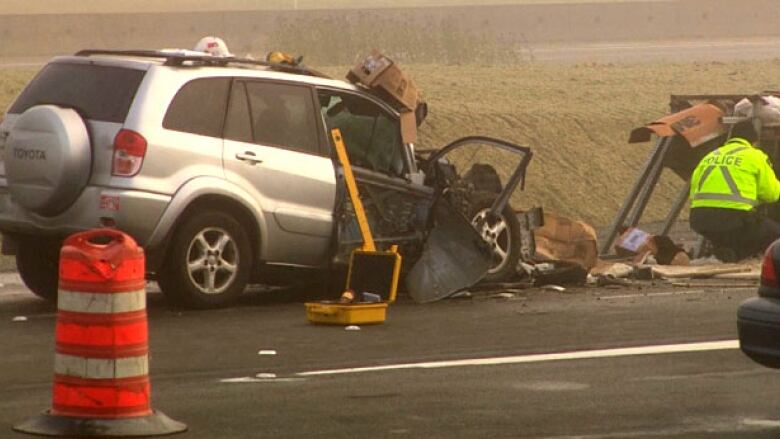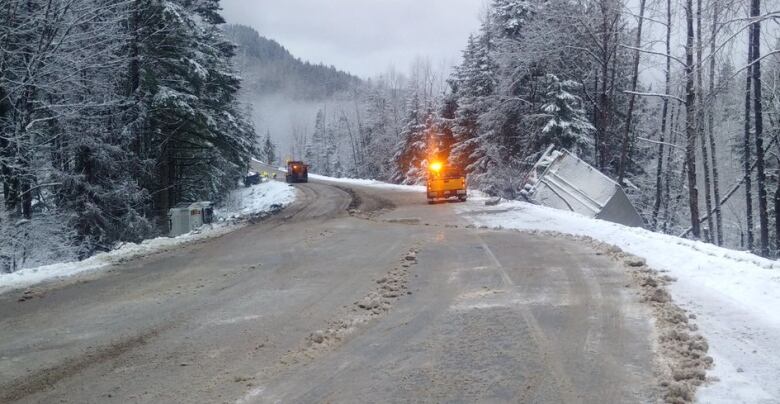Injuries and deaths on the road not just 'the cost of doing business,' says engineer, doctor
Transportation ministry wouldn't say whether any speed-lowering is planned on B.C. highways

Dr.EmilyNewhousesays speedisn't just a police or safety issue: it's a public health issue that becomes frighteningly real in the hospitals of this province.
Newhouse, amedical health officer with Vancouver Coastal Health, says police cite speed as a primary factor in about 30 per cent of collisions in B.C., but to health professionals like her, it's a factor in every collision.
"Collisions are just way more severe, if you're going faster," she told On The Coast's Lisa Christiansen.
"The faster you're going, the harder it is to avoid a collision when it's happening for another reason."
Newhouse says safety needs to be prioritized over higher speeds and gives the example of a pedestrian being struck. When a pedestrian is hit at 30 km/h, she says, they have have a 90 per cent chance of surviving.
But at 50 km/h, survivability drops to only 30 per cent.

"A safe road system is just as much a right as clean drinking water," she said. "We have a right, as a community, to get where we're going safely, and for too long, we've had this attitude: injuries on the road, deaths on the road, that's just the cost of doing business.
"A lot of folks in health say absolutely not. This is preventable."
Engineer: time to lower speeds
GordLovegrove,a University of British Columbia engineering associate professor, agrees human life needs to be given greater weight.
It won't be easy, he acknowledges, but it's time to lower speeds on B.C.'s highways.
"I'm just seeing people driving at literally breakneck speeds," Lovegrove told On The Coast host Gloria Macarenko.
"I think the cost of human life needs to start being weighted higher than simply saying we trust people's judgment."
Lovegrove says accepted thinking about highway speed limits focuses on "the 85th percentile": setting a limit, so that 85 per cent of drivers don't have a large difference in their speeds.
That thinking, he said, was behind the raising of highway speeds in 2014.
But the latest evidence shows the accepted thinking might not be accurate anymore at least not in B.C.
"What we saw, most importantly, was fatal crashes rise significantly," he said.
Speed is political
While some speed limit increases were later rolled back following a jump in serious collisions, Lovegrove thinks they could go down even further to improve safety.
B.C. has special driving conditions that make driving more complicated, he said: curves, hills, corners and poor weather can make conditions tricky and require quicker reactions.
"If we value human life and really want to get to zero fatalities on our roads, we have to ratchet back those speed limits," he said.

But it's a political process, he admits, which he gets. He thinks the public does deserve to be consulted, and there is often pushback to such changes.
When reached for comment, the B.C. Ministry of Transportation did not say any such changes were being considered but touted variable speed signs as a way to limit speeds in poor conditions on some highways.
The Ministry of Public Safety said speed is "just one" factor leading to serious crashes and said it is focusing on other driving behaviours like texting and driving and running red lights.
With files from CBC Radio One's On The Coast
The Speed Factoris a CBCRadio One series taking a closer look at the impact of speed on car collisions in B.C.












_(720p).jpg)


 OFFICIAL HD MUSIC VIDEO.jpg)
.jpg)



























































































